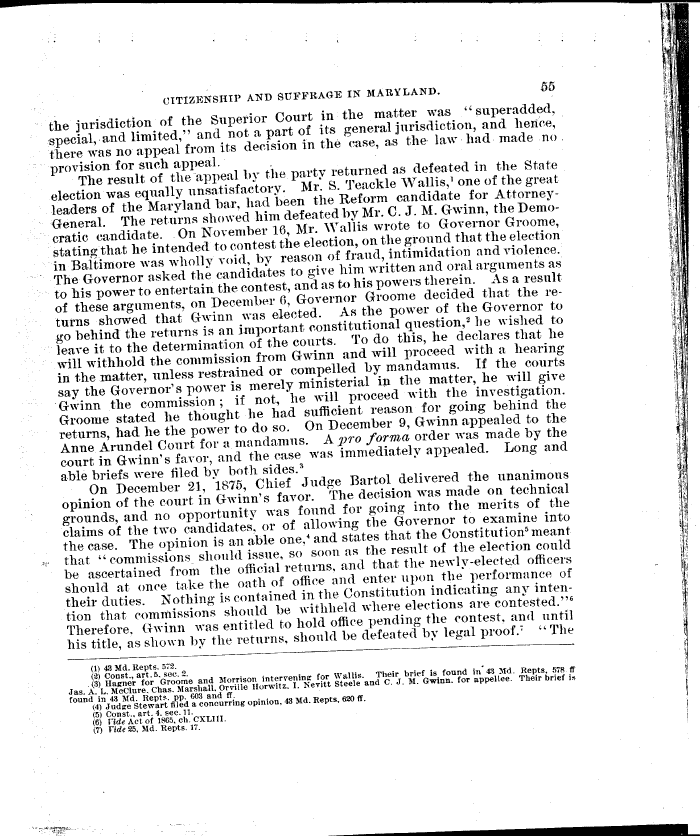|
CITIZENSHIP AND SUFFRAGE IN MARYLAND.
the jurisdiction of the Superior Court in the matter was " superadded,
special, and limited," and not a part of its general jurisdiction, and
hence,
there was no appeal from its decision in the case, as the law had made no
provision for such appeal.
The result of the -appeal by the party returned as defeated in tile State
election was equally unsatisfactory. Mr. S. '1'eackle Wallis,' one of the
great
leaders of the Maryland bar, had been the Reform candidate for Attorney-
Genera.l. The returns showed him defeated by Mr. C. J. bI. Gwinn, the Demo-
cratic; candidate. On November 16, Mr. Wallis wrote to Governor Groome,
stating that he intended to contest the election, on the ground that the
election
in Baltimore was wholly void, by reason of fraud, intimidation and violence.
The Governor asked the candidates to give him written and oral arguments as
to his power to entertain the contest, and as to his powers therein. As a
result
of these arguments, on December 6, Governor Groonle decided that the re-
turns showed that CTwinn was elected. As the power of the Governor to
go behind the returns is an important constitutional qnestion,2 he wished to
leave it to the determination of the courts. To do this, he declares that he
will withhold the commission from Gwinn and will proceed with a hearing
in the matter, unless rest'ra'ined or compelled by mandamus. If the courts
say the Governor's power is merely ministerial in the matter, he will give
the commission; ion; if not he will proceed with
commission;
the investigation.
going behind the
winn G le stated he thought he had sufficient reason for
returns, had he the power to do so. On December 9, Gw'inn appealed to the
Anne Arundel Court for a mandamus. A p~'o forma order was made by the
court in Gv'inn's favor, and the ease was immediately appealed. Long and
able briefs were filed by both sides.
On December 21, 1875, Chief Judge I3artol delivered the unanimous
opinion of the court in Gw'inn's favor. The decision was made on technical
grounds, and no opportunity was found for going into the merits of the
claims of the two candidates, u r of allowing the Governor to examine into
the case. The opinion is an able one,' and states that the Constitution'
meant
that, " commissions should issue, so soon as the result of the election
could
be ascertained from the official returns, and that the newly-elected
officers
should at once take the oath of office and enter upon the performance of
their duties. Nothing is contained in the Constitution indicating anv inten-
tion that commissions should be withlleld where elections are contested."6
Therefore, Gwinn was entitled to hold office pending the contest, and until
his title, as shown hp the returns,
(1) 43 Md. Repts. 5.2.
(2) Const., art. 5. sec. °.
(3) nagner for Groome and Morrison intervening for Nl'allis. Ther brief is
found in ~.3 Md. Repts, 57R ff
.Jas. A. L. McClure. Chas. Marshall. Orville IIcrwitz. I. Isevitt Steele
and C., J. Af. Gwinn. for appellee. There brief i>
found in 4.3 Aid. Repts. pp. 603 and ff.
(4) Judge Stewart filed a concurring opinion, 43 Md. Repts, 620 ff.
(5) Const., art. 9. sec. 11.
(6) fide Act of 196.5, ch. C3iLIII.
(7) fide 25. Sid. Repts. 17.
s, should be defeated b y legal proof.' "The
|

